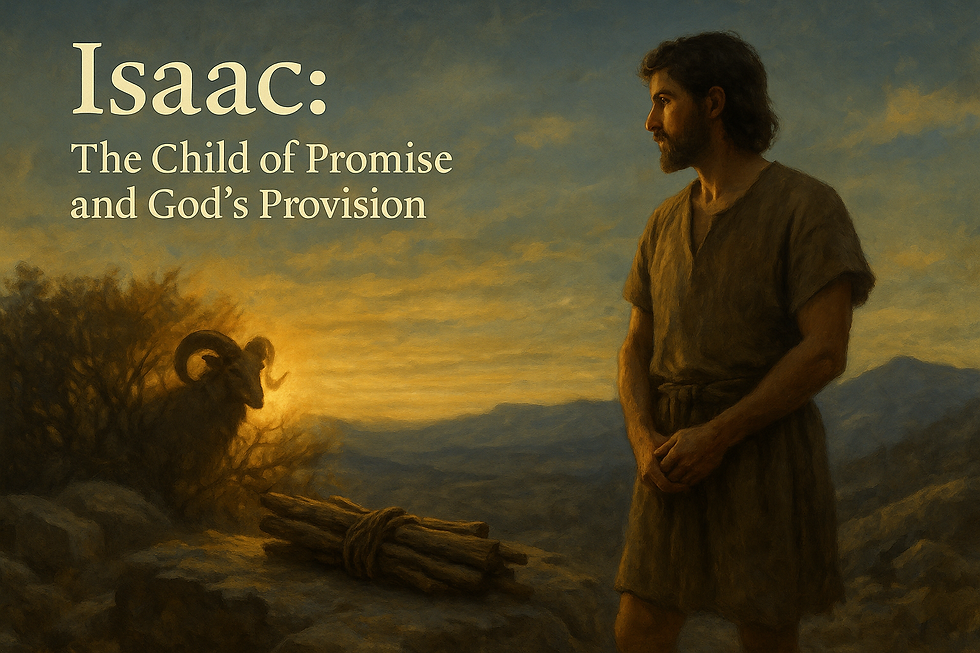Rebekah: The Chosen Bride and Mother of Nations
- Bible Believing Christian

- Sep 2, 2025
- 4 min read

Rebekah: The Chosen Bride and Mother of Nations
Rebekah’s story is one of God’s providence, answered prayer, and the unfolding of His covenant plan. Chosen as Isaac’s wife through divine guidance, she became the mother of Jacob and Esau, playing a critical role in shaping the destiny of Israel. Her life reflects both faith and struggle, hospitality and conflict, and her story highlights God’s sovereignty in accomplishing His purposes even through human imperfection.
Name & Etymology
The name Rebekah (רִבְקָה, Rivqah, pronounced reev-kah) likely means “to tie firmly” or “to bind.” This meaning may symbolize her role in binding the covenant line to the next generation. In the Septuagint, her name appears as Rhebekka (Ῥεβέκκα).
Biblical Narrative (The Story)
Rebekah first appears in Genesis 24, when Abraham sent his servant (traditionally identified as Eliezer) to find a wife for Isaac. At a well outside Nahor’s city, the servant prayed for God’s guidance, asking that the chosen woman would offer water both to him and his camels. Rebekah appeared, fulfilling the prayer exactly. Her hospitality, generosity, and kindness marked her as God’s chosen bride for Isaac.
She agreed to leave her family and go to Canaan, demonstrating courage and faith. When she met Isaac, the text tells us: “She became his wife, and he loved her deeply” (Genesis 24:67, NLT).
Like Sarah before her, Rebekah was barren, but Isaac prayed on her behalf, and God granted her twins (Genesis 25:21). Even in the womb, the children struggled, and God revealed: “The sons in your womb will become two nations. From the very beginning, the two nations will be rivals. One nation will be stronger than the other; and your older son will serve your younger son” (Genesis 25:23, NLT).
Rebekah later played a decisive role in securing the blessing for Jacob, guiding him to disguise himself and receive Isaac’s blessing rather than Esau (Genesis 27). While her actions have been debated, they aligned with the earlier prophecy that the older would serve the younger.
Rebekah spent her later years in Canaan, and though Scripture does not detail her death extensively, she is honored in Israel’s memory as the matriarch who carried forward the covenant line.
Historical & Cultural Context
Rebekah lived in a patriarchal society, yet her role shows remarkable agency. Women were typically subject to arrangements, but Rebekah’s consent to leave her family demonstrates her personal decision and faith. Wells were important social and economic centers, making her encounter with Abraham’s servant symbolic of life, covenant, and future.
Her barrenness reflects a recurring theme in the patriarchal narratives, where God demonstrates His power by opening wombs and ensuring the covenant line comes by divine action, not human strength.
Character & Themes
Rebekah’s character is marked by faith, generosity, courage, and decisiveness. She showed hospitality at the well, courage in leaving her homeland, and determination in ensuring Jacob received the blessing.
Her story embodies themes of divine guidance, answered prayer, family conflict, and God’s sovereignty. Even through flawed choices, God’s purposes prevailed.
Connection to Christ
Rebekah’s role in bringing forth Jacob, the father of the twelve tribes, ultimately leads to Christ, the true Israel. Her encounter at the well foreshadows later biblical well-scenes, such as Jesus’ encounter with the Samaritan woman (John 4), where water and covenant themes intertwine.
Just as Rebekah was chosen by divine guidance to be the bride for Isaac, so too the Church is chosen by God’s Spirit to be the bride of Christ. Her story reflects God’s providence in preparing a bride for His Son.
Theological Significance
Rebekah’s life demonstrates that God’s will prevails even amid human struggle. Her barrenness highlights God’s sovereignty in granting life. Her involvement in Jacob’s blessing shows that God’s plan was not thwarted by family favoritism or deception—He had already ordained that the younger would prevail.
Theologically, Rebekah represents God’s providence: He hears prayer, guides the faithful, and brings about His plan through ordinary people.
Myths & Misconceptions
One misconception is that Rebekah was chosen simply for her beauty. While her beauty is mentioned, the text emphasizes her hospitality and faith, especially in fulfilling the servant’s prayer.
Another misconception is that her actions in deceiving Isaac were purely sinful. While deceptive, they aligned with God’s prophecy, showing His sovereignty even through flawed human actions.
Some also assume Rebekah’s role ended with her marriage, but she remained a decisive figure in covenant history as the mother of nations.
Application
Rebekah’s story challenges us to trust in God’s providence. Her hospitality at the well and her faith to leave her homeland remind us that God guides those who act with faith and courage.
Her life also teaches that God’s purposes are greater than human favoritism or conflict. Even when families fracture or plans go astray, God remains faithful to His promises.
Conclusion
Rebekah, the chosen bride of Isaac and the mother of Jacob and Esau, stands as a matriarch of faith. Her life reflects God’s providence, hospitality, and sovereignty in shaping the covenant line. Through her courage and role in the covenant story, Rebekah points us to Christ, the fulfillment of the promises carried through her descendants.


